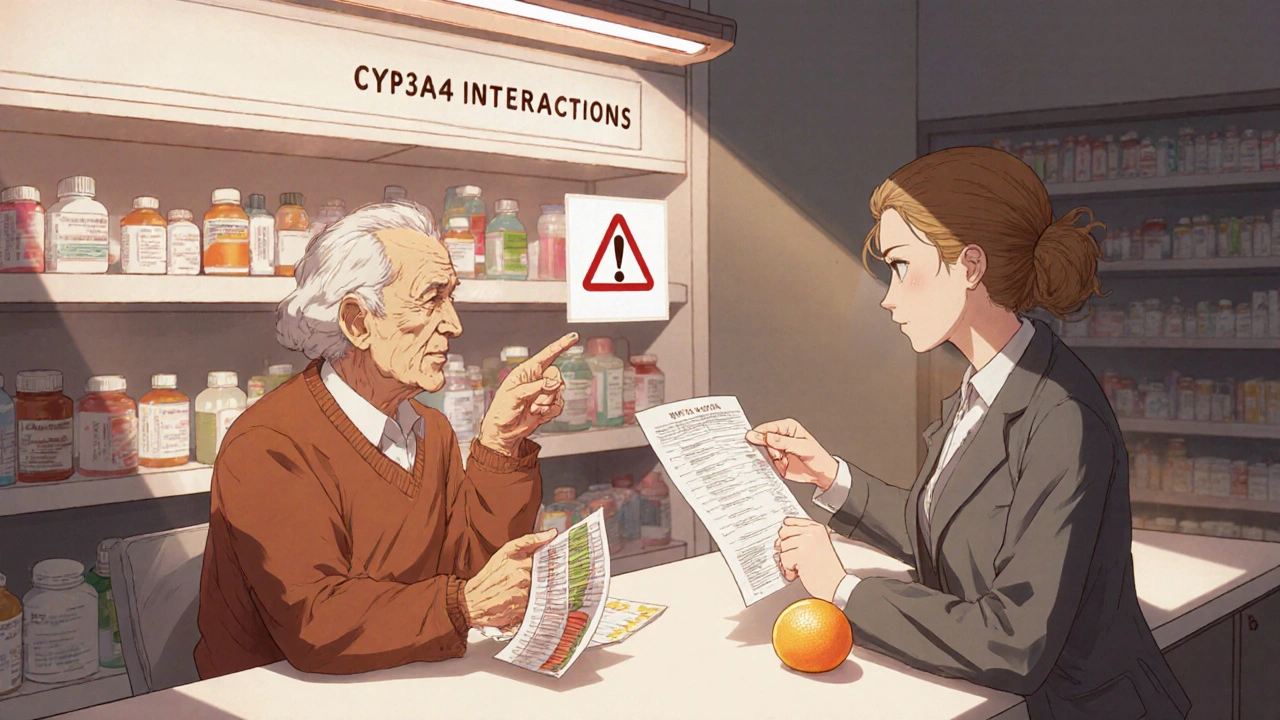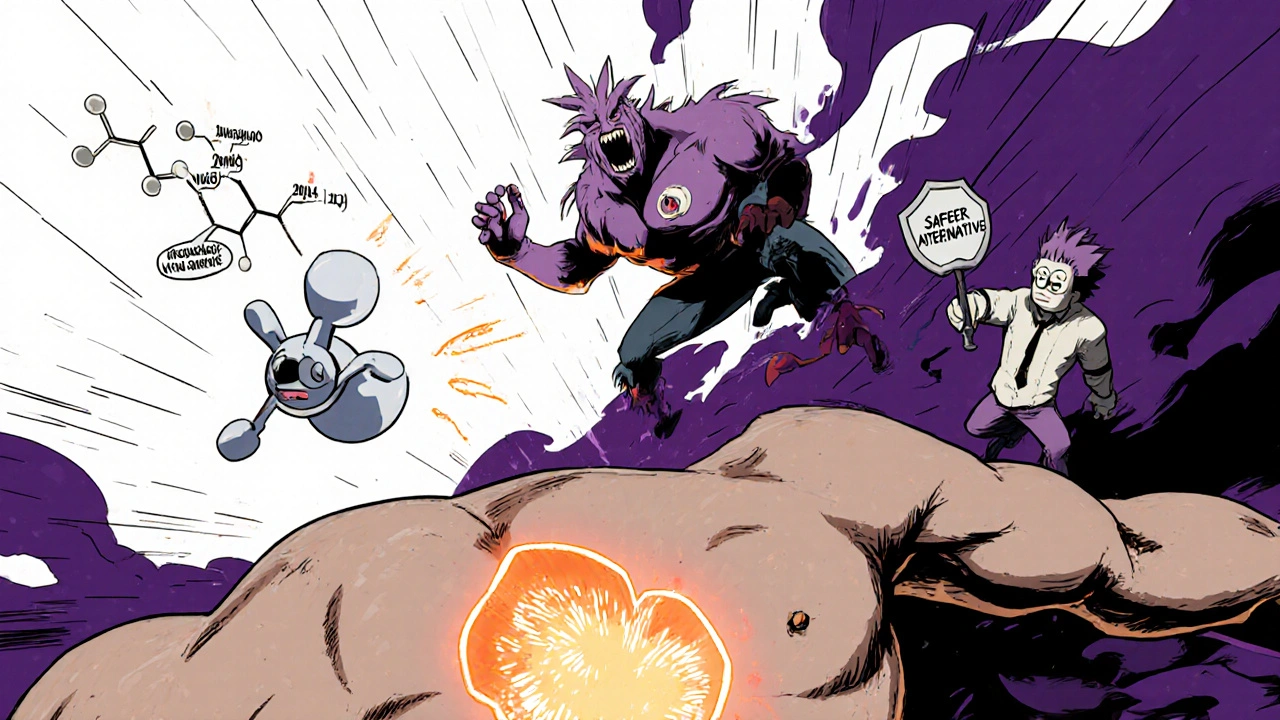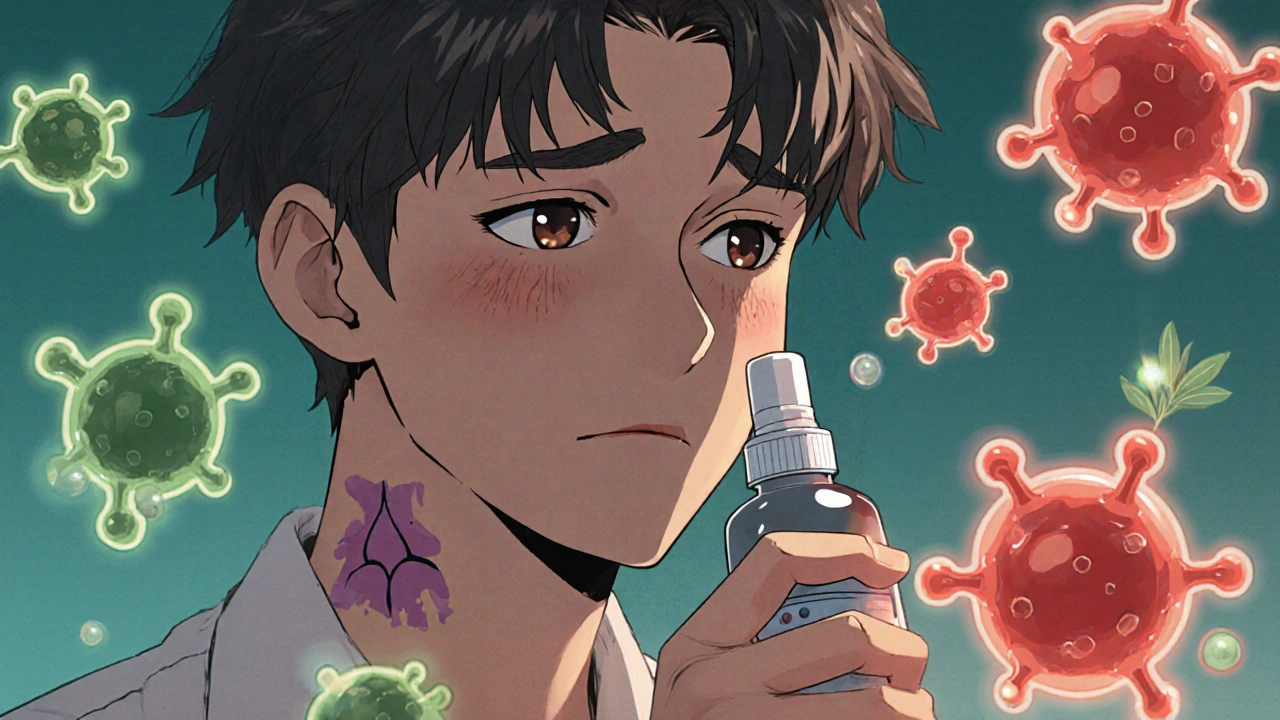Most people use mometasone without any problems. It’s a common steroid nasal spray or cream for allergies, eczema, or asthma. But what happens when you’re also taking other meds? That’s where things can get tricky. You might not realize that your blood pressure pill, antidepressant, or even an herbal supplement could change how mometasone works-or make side effects worse.
What is mometasone, really?
Mometasone is a synthetic corticosteroid. It doesn’t kill germs or cure infections. Instead, it calms down your immune system’s overreaction. That’s why it works for allergic rhinitis, chronic sinusitis, or skin conditions like atopic dermatitis. It’s not a quick fix-it takes days to show full effect. And unlike oral steroids, most of it stays local: in your nose, lungs, or on your skin. Only a tiny amount gets into your bloodstream.
But that tiny amount still matters. If you’re on other drugs that affect how your liver breaks down steroids, that little bit can build up. And that’s when trouble starts.
Which drugs actually interact with mometasone?
Not every medication will cause a problem. But some do-and they’re more common than you think.
Ketoconazole and other strong antifungals like itraconazole are the biggest red flags. These drugs block an enzyme in your liver called CYP3A4. That enzyme normally clears mometasone from your body. When it’s blocked, mometasone sticks around longer. That means higher blood levels. And higher levels can lead to Cushing’s syndrome: weight gain around the face, high blood sugar, muscle weakness, or mood swings. This isn’t rare. A 2023 study in the Journal of Allergy and Clinical Immunology found that patients using both ketoconazole and mometasone nasal spray had 3x higher blood levels of the steroid than those on mometasone alone.
HIV protease inhibitors like ritonavir and lopinavir do the same thing. They’re powerful CYP3A4 inhibitors. If you’re on HIV treatment and also use mometasone, your doctor should monitor you closely. Even a low-dose nasal spray can become risky over time.
Other corticosteroids are another concern. If you’re taking prednisone, dexamethasone, or even hydrocortisone cream on top of mometasone, you’re stacking steroids. That increases your risk of adrenal suppression. Your body stops making its own cortisol. That’s dangerous if you get sick, injured, or need surgery. You might go into adrenal crisis-low blood pressure, vomiting, confusion, even collapse.
Some antidepressants like fluoxetine and sertraline can also slow down CYP3A4, though less strongly. It’s not a deal-breaker, but if you’re on high-dose mometasone and these meds, watch for signs of steroid buildup: easy bruising, thinning skin, or unusual fatigue.
What about herbs, supplements, and OTC meds?
You might think natural means safe. That’s not true when it comes to drug interactions.
St. John’s Wort is the opposite problem. It speeds up CYP3A4. That means your body clears mometasone too fast. It might stop working. Your allergies flare up. Your eczema gets worse. You think the spray isn’t helping-but it’s your supplement making it ineffective.
Grapefruit juice is another silent culprit. It blocks CYP3A4 just like ketoconazole. One glass a day with your mometasone nasal spray? Could be enough to raise steroid levels. It’s not just pills-what you drink matters too.
NSAIDs like ibuprofen or naproxen don’t directly interact with mometasone. But if you’re using it for asthma and also taking NSAIDs, you might be masking symptoms. That can delay diagnosis of worsening lung inflammation. Always tell your doctor what painkillers you’re using.

How do you know if you’re at risk?
Not everyone needs to panic. But you should ask yourself these questions:
- Are you on any antifungal meds, especially for nail or skin infections?
- Do you take HIV meds or hepatitis C drugs?
- Are you using multiple steroid products-nasal spray, cream, inhaler, pills?
- Do you drink grapefruit juice daily or take St. John’s Wort?
- Have you noticed unexplained weight gain, puffiness in your face, or purple stretch marks?
If you answered yes to any of these, talk to your doctor or pharmacist. Don’t stop your meds. But do get a review.
What should you do if you’re taking other drugs?
Step one: Make a full list. Include every pill, patch, inhaler, cream, supplement, and herbal tea. Don’t forget over-the-counter stuff. Even vitamin D or fish oil can matter in rare cases.
Step two: Bring that list to your doctor or pharmacist. Don’t assume they know what you’re taking. Many patients forget to mention supplements.
Step three: Ask specifically: “Could this interact with my mometasone?” Don’t say, “Is this safe?” Say, “Could this make my steroid stronger or weaker?” That gets a more precise answer.
Step four: If you’re on a high-risk drug like ketoconazole or ritonavir, your doctor might switch you. They could change your antifungal to something that doesn’t interfere-like terbinafine. Or switch your mometasone to a different steroid that’s less affected, like fluticasone propionate, which has a lower interaction risk.
Step five: Watch for symptoms. If you start feeling unusually tired, gaining weight fast, or getting bruises easily, call your doctor. These aren’t normal side effects of allergies-they’re signs your body is flooded with too much steroid.
What about kids and older adults?
Children on long-term mometasone for asthma or eczema are more sensitive to steroid buildup. Their bodies are smaller. Their livers are still developing. Always use the lowest effective dose. Avoid combining with other steroids unless absolutely necessary.
Older adults often take more medications. They’re more likely to be on antifungals, heart meds, or antidepressants. They’re also more prone to osteoporosis and high blood pressure-both worsened by excess steroids. A 70-year-old on mometasone and a statin plus an antifungal needs careful monitoring. Annual bone density scans and blood sugar checks become important.

When is mometasone safe with other meds?
Good news: Most people take it without issues. If you’re only on blood pressure meds like lisinopril, diabetes meds like metformin, or thyroid pills like levothyroxine, mometasone is usually fine. These don’t touch the CYP3A4 enzyme. Same goes for most antibiotics like amoxicillin or azithromycin.
Even some NSAIDs and antihistamines like loratadine are safe. The real danger zone is drugs that mess with liver enzymes. Stick to the list above. Everything else? Probably okay-but always double-check.
What’s the bottom line?
Mometasone is effective and generally safe. But it’s not harmless. It’s a powerful medicine. And like any powerful tool, it needs respect.
Don’t assume your pharmacist knows every supplement you take. Don’t assume your doctor remembers every pill you mentioned six months ago. Keep your own list. Update it every time you start or stop something. And never ignore new symptoms-especially if they show up after you added a new drug or supplement.
If you’re on a high-risk medication, ask for a review. Ask if there’s a safer alternative. Ask if you need blood tests. Your health isn’t a guessing game. It’s a conversation. And you’re the most important person in it.
Can I take mometasone with ibuprofen?
Yes, you can take mometasone with ibuprofen. Ibuprofen doesn’t affect how your body processes mometasone. But if you’re using mometasone for asthma and also taking ibuprofen regularly, watch for worsening breathing. NSAIDs can sometimes trigger asthma symptoms in sensitive people. Talk to your doctor if your breathing changes after starting ibuprofen.
Does grapefruit juice really interact with mometasone nasal spray?
Yes. Grapefruit juice blocks the CYP3A4 enzyme in your liver, which helps clear mometasone from your blood. Even though nasal spray delivers most of the drug locally, a small amount still gets absorbed. Drinking grapefruit juice daily can raise that amount enough to cause side effects like weight gain, high blood sugar, or thinning skin. Avoid it if you’re on long-term mometasone.
Is it safe to use mometasone cream and nasal spray together?
It can be, but only under medical supervision. Using multiple steroid products at once increases your total steroid exposure. This raises the risk of adrenal suppression, especially if you’re using high doses or for more than a few weeks. Your doctor may lower the dose of one or both products to keep your total steroid load safe.
Can I stop mometasone if I start a new medication?
Never stop mometasone suddenly, even if you start a new drug. Abruptly stopping steroids can cause withdrawal symptoms like fatigue, joint pain, nausea, or low blood pressure. If your new medication interacts with mometasone, your doctor will guide you on how to adjust the dose safely-usually by tapering down slowly.
Are there safer alternatives to mometasone if I’m on antifungals?
Yes. Fluticasone propionate and budesonide are nasal steroids that are less affected by CYP3A4 inhibitors like ketoconazole. Your doctor might switch you to one of these. For skin use, hydrocortisone 1% is a weaker steroid with minimal interaction risk. Always ask your pharmacist or doctor for alternatives before making any changes.
What to do next
Take five minutes today. Write down every medication and supplement you’re taking. Include doses and how often you take them. Then call your doctor or pharmacist. Say: “I’m using mometasone. I want to make sure nothing I’m taking is making it stronger or weaker.”
That simple step could prevent a serious problem. You don’t need to be an expert. You just need to be informed. And you’re already on the right track by asking this question.

12 Comments
Mike Gordon
October 30, 2025Just read this and my jaw dropped. I’ve been on ketoconazole for a fungal nail thing and using mometasone for my eczema for months. No one ever warned me. I’ve been gaining weight like crazy and my face looks like a balloon. I thought it was just stress or aging. Turns out it’s both. I’m calling my doctor tomorrow. Thanks for the heads-up.
Kathy Pilkinton
November 1, 2025Oh please. Another ‘natural remedies are dangerous’ scare piece. St. John’s Wort? Grapefruit juice? People have been drinking grapefruit juice with their meds for decades and still walk around. If you’re on HIV meds and nasal spray, maybe you shouldn’t be on both. Blame the system, not the juice.
Arrieta Larsen
November 3, 2025I’m so glad someone finally wrote this. I’m on sertraline and mometasone for allergies, and I started getting purple stretch marks last summer. My dermatologist said it was ‘just aging’ until I mentioned the meds. She checked my cortisol levels-turned out I was in early adrenal suppression. I switched to fluticasone and I’m fine now. Don’t ignore weird skin changes. They’re not just ‘stress lines’.
Holly Dorger
November 5, 2025Just wanted to say thank you for this. I’m 68 and on prednisone for polymyalgia, plus mometasone for my nose. I never thought about stacking steroids. My doctor never asked about my fish oil or vitamin D. I’m making a list today. You’re right-your health is a conversation. I’m finally learning to talk.
Amanda Nicolson
November 5, 2025Okay I’m crying. Not because I’m sad, but because I’ve been this person. I took St. John’s Wort for ‘mild depression’ and my mometasone stopped working. My allergies got so bad I had to sleep in a humidifier. I thought I was just ‘getting worse’-turns out my body was flushing the steroid out like it was trash. I stopped the herb, waited a week, and boom-my nose spray worked again. I’m not even mad. Just… relieved. And a little embarrassed.
Jackson Olsen
November 6, 2025So grapefruit juice = bad with this spray? Got it. I drink it every morning. Should I switch to orange? Or just stop? Also, what’s CYP3A4? Just curious.
Penny Clark
November 7, 2025OMG I’m literally on all of these: ketoconazole, mometasone, and St. John’s Wort. I thought the supplement was helping my mood. But I’ve been so tired lately and my face is puffy. I didn’t connect the dots. I’m deleting the bottle tonight. Thank you for saving me from myself 🙏
Niki Tiki
November 8, 2025Why are we even talking about this? People in other countries take way worse stuff and don’t whine. You want to live in a bubble? Fine. But don’t make everyone else paranoid because you can’t read a label. Grapefruit juice? Really? Grow up.
Jim Allen
November 8, 2025So we’re supposed to trust doctors who don’t even know what’s in our cabinets? 😂 I’ve got 12 supplements and 5 prescriptions. No one asked me about them. I just assume everything’s fine until I turn into a steroid zombie. Then I’ll Google it and find this post. Classic.
krishna raut
November 10, 2025Fluticasone safer than mometasone with antifungals. Yes. Also, avoid itraconazole if possible. Terbinafine is best alternative. Simple.
Nate Girard
November 11, 2025My 12-year-old has asthma and uses mometasone daily. He’s also on amoxicillin for an ear infection. I didn’t think twice-until I read this. I checked his meds with his pharmacist. They said amoxicillin is fine, but he’s also taking a children’s multivitamin with zinc. They said it’s fine too. I feel better now. But I’m keeping a list. For real this time.
Carolyn Kiger
November 12, 2025I’m the author of this post. Thank you all for your comments. I wrote this because I almost missed the signs myself. I didn’t realize my daily grapefruit juice was making my steroid work poorly. I thought my allergies were getting worse. Turns out, my body was just flushing it out. I switched to orange juice and my nose cleared up in three days. You’re not alone. And you’re not crazy. Just informed now.